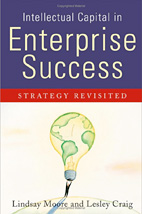Tactical deployment of intellectual assets may bring short-term benefits, but sustainable success depends on thinking and acting strategically. (Originally published in Intellectual Asset Management, London, England)
Archives for 2011
Uncertainty and Scenario Planning
During the 1990s, under the influence of a booming economy in the Western world, rapidly expanding globalization, and the new rhetoric of business models, even respected business gurus propounded the idea that, because everything was changing so quickly, “planning was dead.”
Monetizing IP During Financial Crisis (PDF)
Monetizing IP During Financial Crisis: Recent developments in the world of debt finance, the economy and the resultant recession of 2008 are all challenging companies financially. However, these developments highlight new ways for companies with actual or potential intellectual property to generate income, and in some cases to recapitalize themselves.
Managerial Competencies and the Enterprise Asset Base
Companies often fail to notice that their asset base has or is shifting from traditional tangible assets to an intangible asset base, and that concurrently, their approach to strategy and management must also change to effectively deploy and leverage the shifting asset mix.
Does Google’s Purchase of Motorola Suggest It Is Changing Its Strategy?
In a recent editorial in the Wall Street Journal one commentator on the world of business puzzled that Google would so violate the patent rights of their competitors with their Android mobile operating system. He mused incredulously, that Google seems to assume that their competitors in the smartphone market don’t have a right to exclude them from using their intellectual property.
A New Lesson in Corporate Ethics
Many of our largest companies are often reported as “having more cash than the U.S. Treasury.” These words are spoken in a marveling and laudable voice, and most readers stand in awe that businesses could accumulate so very much cash. As of July 13, 2011, 29 companies had more cash than the U.S. Treasury.
Patenting Food Products and Manufacturing Processes
Many manufacturing companies overlook the opportunity to patent aspects of their products or specialized manufacturing processes. This is especially true in the natural products industries, where unusual ingredients are often mixed together and specialized production processes are increasingly required to make food products and dietary supplement products that are acceptable to consumers. In most natural product categories, it takes substantial innovation for manufacturers to be able to produce successful functional and natural food or supplement products.
Ethical-Regulatory Compliance
Recent ethical, regulatory, and legal responses to enterprise wrong-doing is driving a sea change throughout organizations in the United States. There are many new regulatory guidelines in place, evidencing the imperative to drive ethical behavior and establish integrity across both public and private organizations.
The Ethics of Herbal Folklore (PDF)
I used to work at a dietary-supplements company. We read the authoritative herbals and identified herbs that the traditional knowledge of herbal folklore believed were efficacious in treating health conditions that were commonly served by modern over-the-counter (OTC) products. We reasoned that natural herbal solutions to widespread conditions such as the common cold, sleeplessness and lack of vitality could provide millions of consumers with a more natural lifestyle.





 As the knowledge-based economy expands, the companies and individuals that possess intangible intellectual assets, such as intellectual property, will need specialized expertise, strategic thinking, legal experience, and the wisdom necessary to manage intellectual assets.
As the knowledge-based economy expands, the companies and individuals that possess intangible intellectual assets, such as intellectual property, will need specialized expertise, strategic thinking, legal experience, and the wisdom necessary to manage intellectual assets.